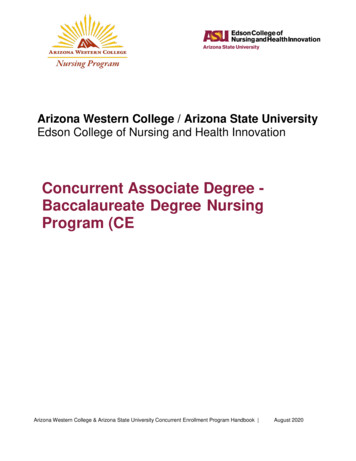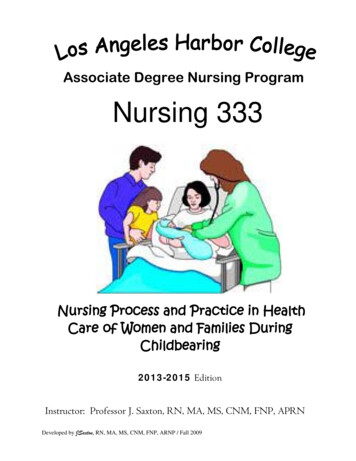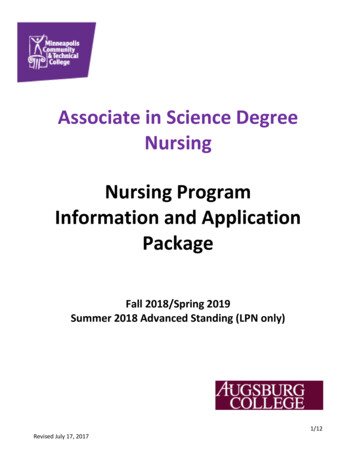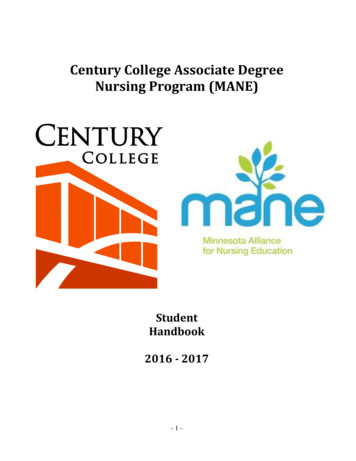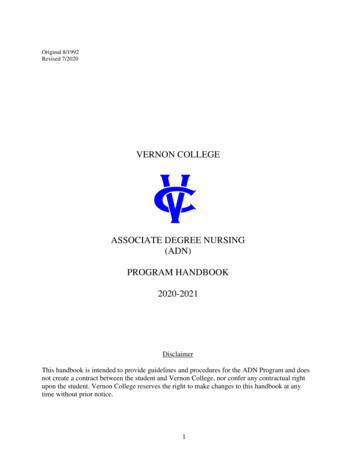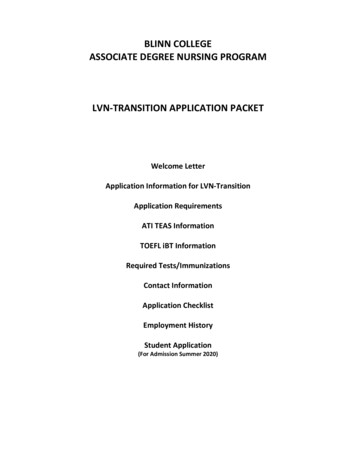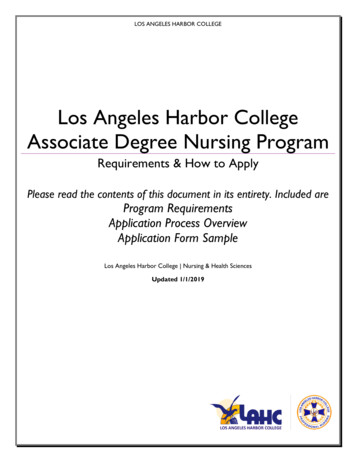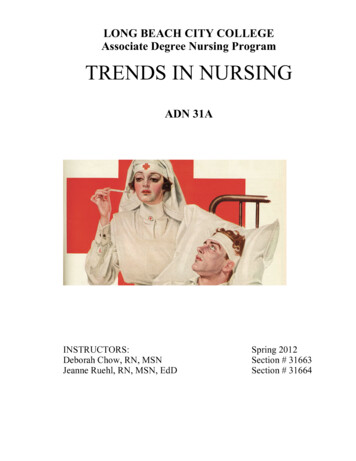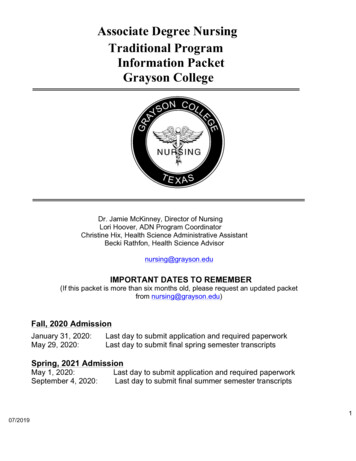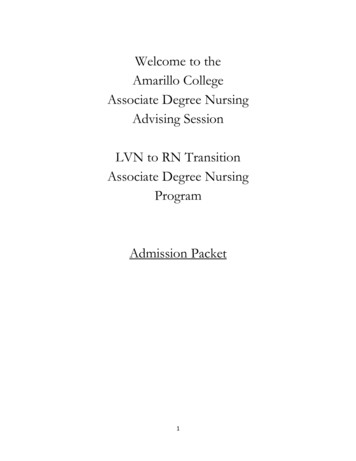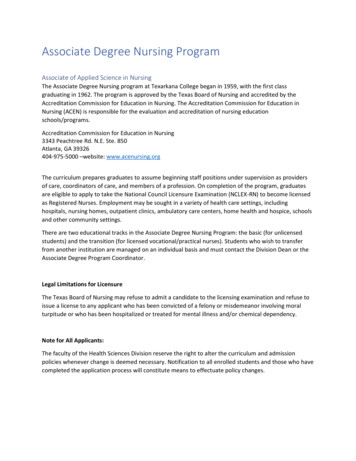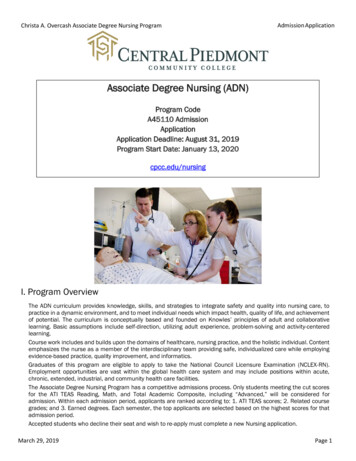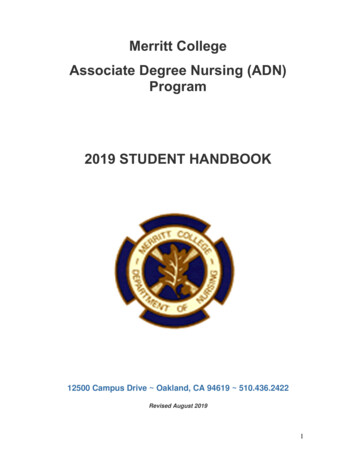
Transcription
Merritt CollegeAssociate Degree Nursing (ADN)Program2019 STUDENT HANDBOOK12500 Campus Drive Oakland, CA 94619 510.436.2422Revised August 20191
Table of ContentsINTRODUCTION . 4HISTORY OF THE ADN PROGRAM. 4LEGEND OF CURRICULUM FRAMEWORK AND UNIFYING THEME:HOMEOSTASIS . 5Philosophy and Mission Statement of the ADN Program .Statement of Philosophy . 6Statement of Purpose . 7Primary Objectives of the Nursing Curriculum . 7Goals of the ADN Program . 7Objectives of the ADN Program . 8Terminal Objectives . 8Level Objectives . 8ADN PROGRAM GENERAL REQUIREMENTS . 10Test of Essential Academic Skills (TEAS) Assessment . 11ADN Program Admission Criteria . 11ADN PROGRAM – COURSE DESCRIPTIONS . 12FIRST SEMESTER . 12SECOND AND THIRD SEMESTERS . 14FOURTH SEMESTER . 15GERIATRICS: INTEGRATED CURRICULUM . 16LVN to RN COURSES. 16ADDITIONAL COURSEWORK . 17OPEN CLINICAL SKILLS LABORATORIES . 18Assessment Technologies Institute (ATI) POLICY . 19NCLEX PREPARATION . 20ADVANCED PLACEMENT . 21TRANSFER STUDENTS . 21ADVANCED PLACEMENT . 22ADVANCED PLACEMENT POLICY STATEMENT . 23ADN CHALLENGE EXAMINATIONS . 25ACT (AMERICAN COLLEGE TESTING) PROFICIENCY EXAMINATIONS . 27ADVANCED PLACEMENT FOR LVNS. 28RETENTION OF STUDENTS . 29BASIS FOR DISQUALIFICATION FROM PROGRAM . 30READMISSION TO THE ADN PROGRAM . 31READMISSION FOR STUDENTS IN “UNSAFE” STATUS . 33ACCOMODATIONS FOR DISABILITIES .33SCHOLASTIC STANDARDS . 33GRADING STANDARDS . 33STUDENT ATTENDANCE AND PUNCTUALITY . 34LATE WORK . 35LATE EXAMS . 35HONOR SYSTEM . 35CLINICAL EVALUATION . 36HEALTH REQUIREMENTS . 37PATIENT SAFETY . 382
PATIENT COMFORT . 38ORGANIZATIONAL SKILLS. 39ASEPSIS . 39UNSAFE PERFORMANCE/PATIENT ENDANGERMENT . 39REMOVAL OF STUDENT BY CLINICAL AGENCY . 40REMOVAL OF STUDENT BY CLINICAL INSTRUCTOR . 40STUDENT APPEAL OF DISMISSAL FOR CLINICAL PERFORMANCE . 41CLINICAL PROBATION POLICY . 42CLINICAL STATUS TERMINOLOGY . 43CODE OF CONDUCT . 44SUBSTANCE ABUSE . 45STUDENT OBLIGATION REGARDING USE OF CHEMICAL AGENTS OR AMEDICAL CONDITION . 47DRESS CODE REQUIREMENTS FOR CLINICAL FACILITIES. 48HANDWASHING AND FINGER NAIL POLICY . 50UNIVERSAL PRECAUTIONS . 51DEPARTMENTAL COMMUNICATIONS. 52APPENDIX . 522019 ADN Program Admissions Brochure . 53NURSING FACULTY . 59BACKGROUND CHECKS . 60FINANCIAL ASSISTANCE . 60MERRITT COLLEGE LIBRARY. 61GRADUATION / PINNING CEREMONY . 61HISTORY OF THE PIN . 62STUDENT REPRESENTATIVES/OFFICERS. 62STUDENT CONCERNS ABOUT A SPECIFIC COURSE OR FACULTYMEMBER . 62STUDENT CONCERNS DIRECTED TO THE FACULTY COMMITTEE . 62STUDENT GRIEVANCE AND DUE PROCESS POLICY . 63ALLIED HEALTH STUDENT GRIEVANCE HEARING . 68STUDENT GRIEVANCE AND DUE PROCESS PROCEDURE . 69DISCLAIMER . 70STUDENT HANDBOOK FORM .713
INTRODUCTIONMerritt College is one of four institutions operated by the Peralta Community College District. Theother colleges of the Peralta District are the College of Alameda, Laney College, and BerkeleyCity College. Merritt College also administers a community-outreach training center located in theFruitvale district of Oakland.The Merritt College Associate Degree Nursing (ADN) program is accredited by the WesternAssociation of Schools and Colleges and is approved by the California Board of RegisteredNursing, the California State Department of Education, the Veteran’s Administration for thetraining of veterans, the Federal Department, and the Federal Immigration and NaturalizationService for foreign student education. The courses in the ADN program are accepted by theUniversity of California, the California State University system and many other public and privateinstitutions of higher learning.The ADN program is part of the Allied Health Department. The other programs in the departmentare the Chronic Care Assistant program, the Medical Assistant program, and the RadiologicScience program. Excluding the director, there are seven full-time instructors in the ADNprogram. Supplementary lecture faculty and clinical instructors are hired on an as-neededbasis. A full-time senior clerical assistant assists with the administration of the Allied HealthDepartment. One part-time senior clerical assistant is dedicated to the ADN Program.HISTORY OF THE ADN PROGRAMThe Kellogg Foundation, during the year of 1960-1961, funded the ADN program. Cooperationwith the Junior College Bureau of the California State Department of Education providedprofessional nursing consultation services, financial support and resource information. InSeptember of 1961, 36 students were admitted to the first class.Mrs. Gingrich, the first coordinator of professional nursing, said, “In this responsibility of makingnursing education a part of the whole educational community, Oakland City College joins otherjunior colleges in California, to provide an increased opportunity to prepare qualified persons whowill help to meet the growing need for professional nursing care.”The name Oakland City College has since been changed to the present Merritt College, but thetradition of making nursing education a part of the educational community remains the same.4
LEGEND OF CURRICULUMFRAMEWORK AND UNIFYINGTHEME: HOMEOSTASIS"Survival is the body's most important business -- survival of itself and survival of the humanspecies. To achieve survival, the body must carry on ceaseless and almost numberless activities.-- Life is synonymous with these activities; death is synonymous with cessation of theseactivities."*The preceding paragraph adequately describes the conceptual framework and the unifying themechosen by the faculty of Merritt College Associate Degree Program, which is HumanHomeostasis.Homeostasis may be defined as the dynamic equilibrium between the organism and its internaland external environment. This dynamic equilibrium is under the control of the body's regulatorymechanisms and processes, both voluntary and involuntary.These mechanisms and processes are important indications as to the adequacy of responses thebody can make to stimuli or challenges to its integrity.In response to either internal or external stimuli or challenges, compensatory mechanismsoperate to maintain homeostasis, the dynamic equilibrium.The compensatory or adaptive mechanisms tend to restore or maintain homeostasis. Theseadaptive mechanisms also describe activities throughout the life-time of the individual andthrough stages of human development including conception and death.The faculty chose this concept because it adequately describes the process by which we derivedour curriculum, the process by which students may contact and process new ideas, the processby which we may view nursing and the process by which we may view changes in learning andteaching.We think it is important to note that a "steady state" in teaching and learning and in matters of thecurriculum, means change and the inflow of new ideas so that the curriculum will never be miredin a static state.The unifying theme also symbolizes the idea that man brings to the world his socio-cultural,physical and psychological integrity, which in turn is challenged by and interacts with his internaland external environment from conception to his grave. The triangle in the framework alludes tothe strength of the effort man makes to maintain his integrity. The circle denotes the life anddeath, health and illness continuum throughout the lifetime with which we as nurses must interact.In other words, homeostasis means, to our faculty, a “condition which may vary but which isrelatively constant" within a narrow socio-cultural, physiological and psychological range.5
It is our hope that we will help students to see the overall logical picture of the importantphenomenological concept.*Anthony & Kortnoff Textbook: Anatomy & PhysiologyReviewed and reaffirmed by Merritt College ADN Faculty and Student Representatives – Fall, 2008Philosophy and Mission Statement ofthe ADN ProgramStatement of PhilosophyWe, the faculty of the nursing program at Merritt College, believe that nursing education is mosteffectively carried out in a collegiate setting in which the controlling body is the college. Thecollege is dedicated to serve both the community and the individual. We believe that theeducational program should provide for the personal growth of the student taking intoconsideration his/her cultural, ethnic uniqueness and support system and should better preparehim/her to assume the responsibilities of a citizen in his/her community. The educational programshould be challenging, broad in scope and flexible to meet individual needs, with generaleducation courses to precede or accompany nursing education courses.We believe that education is an on-going process of learning whereby the individual, in responseto his/her learning styles and experiences, assimilates and integrates knowledge, develops skillsand incorporates attitudes resulting in the modification of more positive behavior. Learning isfacilitated in an environment in which the student feels accepted and valued as an individual withvarying needs, abilities, skills, past experiences and goals. We believe learning is most effectivewhen it is self-directed and the student perceives experiences as meaningful. The facultyparticipates in the learning process by providing guidance while encouraging the student towardself-direction and by sharing with the student the responsibility of evaluating his/her learningstyles and experiences.We believe that man is unique as an individual and as a human being. No two human beings arealike, therefore, his/her uniqueness is a precious commodity which, in turn, points to his/her valueas a human being possessing energy to grow, to adapt, to adjust, and to demonstratehomeostatic processes in his/her own unique manner.Human ideas and behavior are dramatic and diverse because of our ability to change and adaptto a variety of situations and environments. Therefore, the nursing care of men and women mustrely on the holistic approach that views the structure and function of men and women in contextwith his/her inner and outer environment as a whole person. The holistic approach also focuseson cultural factors that exert powerful influences on his/her health and his/her attitudes towardillness and death.6
We believe nursing is a profession in which a service is rendered to the community incollaboration with other professions to help individuals achieve and maintain homeostasis - astate of dynamic health which allows clients to function at their optimum level of physical,emotional and social well-being. The client is defined as the patient and his/her family (orsignificant others) who have health care needs.The role and position of the nurse is complex and dynamic. This role results from advancedtechnology and increased knowledge in the behavioral, natural and applied sciences, withresultant social changes in health values and practices. Nursing care focuses on a holisticapproach in the total care of the individual in his/her environment. Nursing care facilities provide aforum for adaptation for health teaching, prevention of illness, maintenance of wellness,restoration and rehabilitation toward independence and self-sufficiency.The program is designed to prepare the graduate to assume a first level nursing position in ahospital and similar community agencies and to take responsibility for further professional growth.Statement of PurposeThe nursing program at Merritt College recognizes the “Merritt College Mission Statement andPhilosophy” and is committed to educating nurses who will serve this community as stated in the“Philosophy and Primary Objectives” of this nursing program.Merritt College Mission StatementThe mission of Merritt College is to enhance the quality of life in the communities we serve byhelping students to attain knowledge, master skills, and develop the appreciation, attitudes andvalues needed to succeed and participate responsibly in a democratic society and a globaleconomy.Primary Objectives of the Nursing Curriculum1. To help the student incorporate and apply principles of teaching, learning, andhomeostasis when he/she is in a care-giving relationship with patients, family, and staffmembers.2. To help the student, in an on-going process, develop an awareness of him/herself as aperson and as a practitioner with respect to his/her abilities, needs, motives, culture,values and attitudes.3. To help the student develop the ability to provide knowledgeable, safe nursing care withappropriate supervision to one or a group of patients.4. To help the student become knowledgeable in the utilization of the nursing process,thereby increasing his/her effectiveness as a member of the health team.Goals of the ADN Program1. It is the goal of the program to maintain a program consistent with current Board ofRegistered Nursing regulations, State Education Codes, Peralta Community CollegeDistrict policies and ADN program policies.7
2. It is the goal of the nursing program to maintain an educational program that will preparestudents as competent and safe entry-level nurses who deliver holistic, quality healthcare.Objectives of the ADN Program1. Establish, implement and review on a regular basis the philosophy and objectives of theprogram.2. Plan, implement and evaluate curricula to ensure that it is consistent with the philosophyand objectives of the program.3. Re-evaluate and revise the curricula to ensure currency with the criteria set by the Boardof Registered Nursing for all aspects of the program.4. Reevaluate admission, progression, transfer and challenge examination policies on ayearly basis to assess their effectiveness and consistency with college policies and Boardof Registered Nursing policies.5. Revise and implement nursing program policies and procedures per the programevaluation plan.6. Participate in budget planning by recommending needed resources such as facilities,books, journals, audio-visual hardware and software.7. Interview and recommend new faculty for appointment by college administration.8. Meet as often as necessary to complete and implement all program business.Terminal ObjectivesAt the completion of the Associate of Science in Nursing Degree, the graduate of Merritt Collegewill function in an acute, primary or secondary setting and will be able to:1. Use the nursing process to assist clients in their adaptation to stressors by applying abroad array of theories and concepts derived from bio-sociology, physio-psychology,humani
The program is designed to prepare the graduate to assume a first level nursing position in a hospital and similar community agencies and to take responsibility for further professional growth. Statement of Purpose The nursing program at Merritt College recognizes the “Merritt College Mission Statement and
